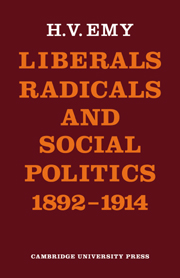Book contents
2 - The Liberals in office 1892–5
Published online by Cambridge University Press: 04 May 2010
Summary
POLICY
In July 1892, the Liberals and their Irish allies gained a majority of 40 over the 315 Conservatives and Liberal Unionists. The majority was a small one, dependent upon the umbilical cord of Home Rule and open to a host of speculative interpretations. If the Home Rule policy occupied the first place in politics, the amorphous bulk of the social problem constituted, after Newcastle, a strong contender for second place. The test questions had already emerged. The entry of local Labour associations into politics had brought widespread attempts to secure fair-wage clauses in local contracts, and the Liberals faced an articulate demand that the government create a precedent in the struggle for wage-justice by establishing minimum wages in government departments. Wages were further entwined with the issue of hours, particularly in the case of the miners whose demand for an eight-hour day was now strong enough for them to expect legislative attention. Labour leaders placed a heavy emphasis upon hours' legislation in general: ‘the legal eight-hour day is the grappling-iron between the competition of today and the co-operation of the future’. The Liberals, however, were concerned with the implications of such legislation, for in 1892, social reforms for the working classes were not yet identical with the claims of labour. Social reform involved measures that were recognisably national, were not the single prerogative of a political party and were open to discussion by men of goodwill on all sides of the political spectrum.
- Type
- Chapter
- Information
- Liberals, Radicals and Social Politics 1892–1914 , pp. 38 - 63Publisher: Cambridge University PressPrint publication year: 1973



